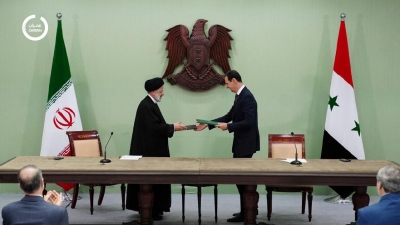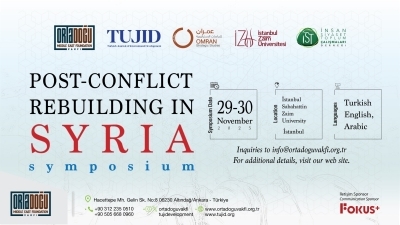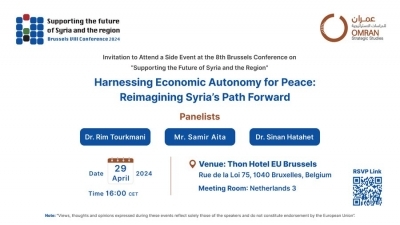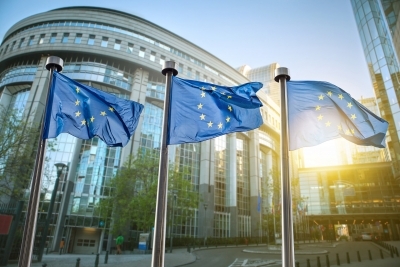General Summary
This report provides an overview of the key events in Syria during the month of December 2023, focusing on political, security, and economic developments. It examines the developments at different levels.
- Politically, the Regime government has continued to promote its perspective in global discussions, arguing that rebuilding efforts should not be contingent on political conditions. Meanwhile, the Autonomous Administration formed a new presidential council and adopted a controversial social contract.
- Security, the ongoing war in Gaza has influenced the security situation in Syria. Israel has intensified its airstrikes against various military and logistical sites. The most significant strike, with a substantial impact on the IRGC, was in Sayyida Zeinab, resulting in the death of a prominent IRGC commander, Sayyed Reza Mousavi. Additionally, the Syrian-Jordanian border witnessed clashes between Jordanian forces and a group of drug smugglers.
- Economically, the Regime government's financial policies continue to be a key factor in the instability of the Syrian pound, unpredictable price increases, and the export of agricultural goods without considering local needs. Internationally, Iran has maintained its efforts in signing agreements and understandings with the Syrian Regime, aiming to gain greater control over Syria's economy.
Heightened Diplomatic Maneuvers, and a Controversial New Social Contract in Northeastern Syria
The regime's representatives in both the Security Council and the United Nations continued to assert their political narrative before the international community. “Al-Hakam Dundee,” the acting representative of the Syrian regime in the Security Council, continued to criticize Western countries for imposing economic sanctions on Syria, particularly the (Caesar Act), and insisted on the right to manage humanitarian aid from Damascus through Syria's official channels, not from Gaziantep, al-Rai, or Bab al-Salama crossings. In the ongoing search for solutions to the economic crisis, “Qusai al-Dahhak,” the regime's permanent delegate to the United Nations, participated in the second Global Refugee Forum held in Geneva.
During several meetings with international leaders at the Doha Forum, the Syrian opposition's political discourse concentrated on critical issues:
- The opposition emphasized the necessity and importance of reactivating the stalled constitutional committee. They warned of the dangers associated with the absence of serious international pressure to initiate a political process. Such a process is vital for the full implementation of Resolution 2254 and is critical to addressing the deteriorating humanitarian and security situations in Syria.
- They highlighted that the continued stagnation of the political process will have negative repercussions on humanitarian matters. Furthermore, they stressed the significance of supporting sustainable development projects in northern Syria to ensure long-term stability and growth.
Meanwhile, at its 4th conference in al-Raqqa, the Syrian Democratic Forces Council announced the election of a new council led by Mahmoud al-Mashhadani and Layla Qahraman. This change abolishes the executive president position, which had been held by Ilham Ahmed since the council's establishment in late 2015.
Al-Mashhadani, hailing from a prominent tribal family in al-Hasakah province, is a well-known and influential figure in the region. His appointment could be interpreted as a desire by the Administration or Washington to strengthen relations with Arab tribes in northeastern Syria, particularly following recent conflicts in Deir Ezzor. Additionally, it may signal the possibility of opening communication channels with areas controlled by the opposition and the regime.
In addition, the Autonomous Administration also approved the new Social Contract Law, renaming itself to (Democratic Autonomous Administration in North and East Syria,) which has several issues, including:
- It was drafted by the ruling party and its allies, thus reflecting the perspective of the de facto authority and its orientations.
- It emphasizes the continuation of the de facto authority imposing its philosophy, which is alien to the region's inhabitants and rejected by several components as it does not represent them.
- The inability to activate many of its articles for various reasons, making them problematic.
From an international perspective, the Turkish Defense Minister, Hulusi Akar, has linked the continuation of the Turkish presence in Syria to two key conditions: the elimination of terrorist organizations and the achievement of an agreement between the regime and opposition, leading to the drafting of a new constitution for the country and subsequent elections. This stance represents one of the ongoing challenges in the normalization process between Turkey and the Syrian regime, a dialogue-initiated months ago under Russian mediation. In parallel, the international envoy to Syria, Geir Pedersen, met with the Russian Deputy Foreign Minister in Moscow. This meeting was part of Pedersen's ongoing efforts to discuss the resumption of the constitutional committee's work and address issues related to normalizing the social and economic situation in Syria, particularly considering the negative impact of sanctions and the lack of international funding.
Strategic Shifts in Syria: From Israeli Airstrikes to Internal Power Dynamics
The recent Israeli airstrikes in Damascus, which led to the death of Reza Mousavi, one of the oldest advisers of the IRGC in Syria, mark a continuation of Israel's strategy to target key Iranian figures orchestrating Tehran's security operations in Syria. These strikes, five in total across various Syrian regions, aim to dismantle Iranian strongholds and thwart Tehran's military support to Lebanon and Syria. Conversely, Iranian-backed militias have continued targeting U.S. bases in northeast Syria and northern Iraq in response to Israeli actions in Gaza.
In Southern Syria, the Regime continues to employ aggressive security tactics, including assassinations and city sieges, to assert its dominance over Daraa province. This is ostensibly to combat the remnants of “terrorist organizations.” Recently, regime forces encircled the city of Jassem for several days, conducting searches of civilian homes and farms in response to local armed factions attacking nearby security patrols. In addition, the area has seen a surge in Assassination attempts over the past month, affecting both civilians and military figures. Notably, Radi al-Hashish, the leader of the Central Committee in Daraa's western countryside, and Muhammad Yassin al-Makkhal, a drug dealer with ties to the Military Security branch, were assassinated. These incidents highlight the prevailing lawlessness exploited by various factions to further their agendas.
On the Jordanian-Syrian border, tensions escalated with a Jordanian air strike on the town of al-Mata'iya following skirmishes between the Jordanian army and smuggling groups. These clashes resulted in casualties, arrests, and the confiscation of significant quantities of drugs and weaponry. This marks a significant escalation in both the intensity and location of these confrontations, potentially leading to increased military and security tensions in southern Syria. Moreover, it raises the likelihood of Jordan engaging more directly in future conflicts with Iranian militias and smugglers, deviating from standard engagement protocols. This shift is partly due to the threat that border smuggling poses to Jordan's national security. Additionally, these developments could undermine the Arab Initiative's efforts to normalize relations with the regime, representing a continued setback for regional stability.
In Northwestern Syria, Hay'at Tahrir al-Sham announced the dismissal of leader Jihad Issa al-Sheikh, also known as Abu Ahmad Zakour, for violating the group's policies. This move is part of a broader strategy to consolidate Al-Julani's control and eliminate internal competition, preparing the group for a new phase of leadership without the Old Problematic Members.
In Northeastern Syria, Turkish intelligence claimed responsibility for the assassination of Sherwan Hassan, a military commander in the SDF's Deir Ezzor region, through the use of Vehicle-Borne Improvised Explosive Devices (VBIEDs). Additionally, in response to an attack by the Kurdistan Workers' Party (PKK) on a Turkish military site in Northern Iraq, which resulted in the deaths of 12 Turkish soldiers, the Turkish military has targeted approximately 50 sites. These include oil fields, military installations, and other facilities.
Navigating the Complex Economic Landscape: Currency Devaluation, International Alliances, and Local Infrastructure Developments
In the Regime Held-Areas, the Central Bank of Syria's recent adjustment of the Syrian pound's exchange rate against the U.S. dollar continues its 2023 monetary policy of 'managed floating' or 'directed floating.' While this approach allows market forces to influence the exchange rate, primarily guided by the black-market rate, it has resulted in the rapid devaluation of the Syrian Pound. The pound plummeted to 14,200 SYP on the black market and 12,500 SYP officially. Moreover, the regime increased the customs dollar rate by 30%, setting it at 8,500 SYP per U.S. dollar, up from 6,500 SYP. This adjustment is likely to further escalate prices of goods and services, encourage smuggling and the shadow economy, and impose additional burdens on exporters and importers due to increased customs duties. The regime's monetary strategies have already led to significant price hikes in essential commodities, with a 25% increase in meat prices from the previous month and soaring prices for vegetables and fruits. Subsidized gasoline prices have also seen the eighth increase within a year, reaching around 9,000 SYP per liter, while the price of free diesel rose to 10,900 SYP per liter, and fertilizer prices surged by up to 200%. Despite the economic strain these measures impose, the regime continues to export fruits, citrus, and Awassi sheep to Gulf markets, exacerbating local price inflation and ignoring the economic burdens on citizens, traders, and industrialists.
Internationally, the first shipment of industrial gas cylinders from India recently arrived in Syria, marking a notable development since the imposition of economic sanctions by Western countries in 2012. Amidst global attention on Gaza, this shipment underscores the regime's efforts to establish trade relations with friendly nations and secure vital supplies. Additionally, Air Algerie has resumed flights to Syria after a 12-year hiatus, signaling a gradual re-engagement with the international community. The regime has also held economic discussions with Baghdad to rejuvenate the electrical connection project between the two nations at the Bukamal/Qaim border point. Further, the Minister of Oil, Firas Qaddour, has engaged in talks with the Ambassador of the Republic of Venezuela to bolster cooperation in the oil and mineral resources sectors.
Meanwhile, the regime's relationship with Iran continues to strengthen, as evidenced by the signing of memorandums of understanding across various sectors, including banking, finance, tourism, and trade. These agreements are designed to bolster Iranian investment in Syria, facilitating initiatives such as the establishment of electric power plants and the elimination of customs duties between the two nations. The Central Bank of Syria and its Iranian counterpart are exploring avenues to enhance trade relations, including the establishment of a joint bank and the implementation of projects under an entity affiliated with Iran's Supreme Leader, Ali Khamenei.
In the SDF Held-Areas, the northern and eastern regions of Syria have experienced a severe fuel crisis following the Turkish army's targeting of oil fields in al-Hasaka province. These strikes have caused collateral damage to other sectors, including electricity generation and industrial and agricultural production. In Amuda city, for instance, 20 out of 40 generators ceased operation due to not receiving their diesel allocations from the relevant authorities. Similarly, many neighborhoods in al-Qamishli have reported power outages from generators due to diesel shortages. Furthermore, the Autonomous Administration (AANES) has taken precautionary measures to protect foreign currency reserves in its territories. It has prohibited the outflow of U.S. dollars to areas controlled by the regime and the opposition as part of a broader strategy to restrict financial transactions. This decision suggests an uptick in financial or cash outflows through smuggling, illegal business activities, money laundering, and evasion of fees and taxes.
In Qamishli, minibuses (Saravis) drivers have gone on strike protesting the 4,000 SYP fare per passenger, which fails to cover fuel and repair costs. They are demanding an increase in the current fare to 5,000 SYP to better reflect their operational expenses.
In the Opposition Held-Areas, the Syria Recovery Trust Fund (SRTF) has initiated a project to support olive cultivation in the northern countryside of Aleppo, providing around 1,000 farmers with planting, pesticides, harvesting, and pruning equipment. The project is backed by a total budget of €1.89 million. Additionally, in response to the increasing demand for lending services in trade, services, manufacturing, industry, and agriculture sectors, the SRTF has launched the second phase of the livelihood project. This initiative aims to offer various loans and non-financial products and services to 1,170 entrepreneurs. In northwestern Syria, loans range from $400 to $8,000. The President of the Syrian Interim Government (SIG), Abdul Rahman Mustafa, inaugurated the third bridge project in the city of Afrin. This initiative aims to alleviate pressure and congestion by linking the city's entrances and exits with other areas, as well as reducing security risks through enhanced control and meticulous scrutiny of trucks.
The Ministry of Justice in the Salvation Government of Idlib has established a commercial court in the city of Sarmada. This court is aimed at addressing lawsuits and disputes arising among merchants registered with the chambers of commerce. The establishment of this court follows a series of decisions aimed at enhancing regulatory control, including one to oversee contracting procedures. These measures are expected to contribute to the institutionalization and governance of the region and the regulation of commercial affairs. This is particularly pertinent given the extensive business activities and the complexity of commercial relations, accentuated by the Bab al-Hawa crossing that links Idlib with Turkey. Furthermore, the Salvation Government is attempting to attract investors to the areas under its control.
On the other hand, the chambers of industry and commerce of the local councils in the northern and eastern countryside of Aleppo have increased the annual fees for traders crossing into Turkish territory from $2,200 to $5,000. This decision is expected to negatively impact the economic landscape of the region, leading to a reluctance among many to register due to the high fees, a diminished interest among industrialists and traders to participate in economic activities, and increased unemployment rates. Meanwhile, the region's electricity company, AK Energy, issued a new list of electricity prices in December. The rates are now set at 2.81 Turkish Lira (TL) for household subscriptions and 3.22 TL for commercial subscriptions. Additionally, the Turkish government has opened a new PTT center in the city of Azaz to alleviate congestion at the existing center.




